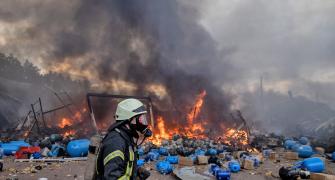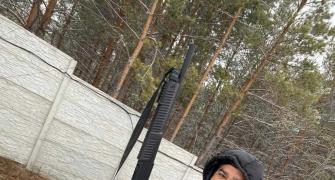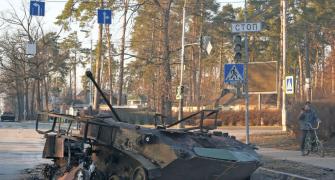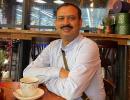'Bola nikal jao. Sala firing karte hai Russi.'

Bombs are spitting down from the frosty winter sky in Kyiv. But Mahadev Sahay* sounds rather cheerful.
Like the fine weather they are having is not a matter of worry.
His logic: "Mere ko koi chinta nahin hai, kyonki mein toh purana aadmi hoon, aur janta hoon in Rusiyon ko. Inko (Ukrainians) bhi samajhte hai. Toh panic karne se fayda hai nahi? (I have no worries. I am an old resident. I understand Russians. Ukrainians too. There is no use in panicking)."
"As per the current situation if one stays at home, it's better (safer)."
He and his family are tightly locked down in their house about 7 km east of the city centre, on the left side of the Dnieper river on the Sviatoshynsko-Brovarska Metro line.

It's a large family. His grown-up son and daughter are also staying with him and his Ukrainian wife in the same home, as too are his two tiny grandchildren and daughter-in-law. "Hum log sab ikathe hai (We are all together)."
On the first day of the unexpected Russian bombing, on February 24, the Sahay family made a valiant attempt to skip the city and head to their farmhouse in western Ukraine. But they didn't succeed and turned back for home.
"Pahila din jab bombing hua tha 4.50 am, mein doh ghante ke andar apne family ko le kar ke ja raha tha (On Day One when the bombing began at 4.50 am, within two hours I had packed up the family and we were leaving town).
"Raste mein itna traffic thi ki mein shahar se nikal nahin paya -- 30 km dead (rasta) ho gaya pura. Doh ghanta mein aadha petrol tanki jal gaya, gadee ka. Toh mein risk nahin liya, aur vapas aa gaya (There was just so much traffic that we could not leave the city -- for 30 km the traffic was at a standstill. And we burnt up half a tank of fuel. I didn't take any further risk and we turned around and came back)."
"We thought we would go the next day. But by the next day the situation had gotten so bad that it seemed to leave with the family and children would be too dangerous. That's why I have not left and am still in Kyiv."
After that the Sahay family took a sober, cautious collective decision to remain behind for the time being, especially since there are very young children in the home.
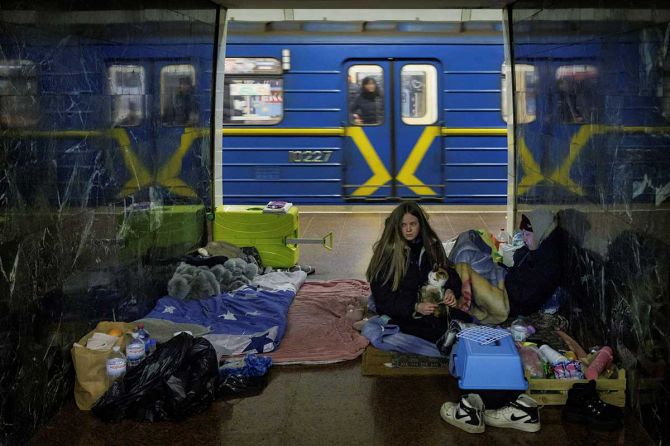
Bomb shelters and the Metro stations are not viable alternatives. "Sab full hai ek dum (They are packed)."
The house has a two metre-high basement-cellar of sorts which is "badiya saaph sutra cemented (excellent, clean and cemented)."
When it was still feasible to step out, 10 days ago, they stocked up. There's 10 litres milk chilling in the fridge, a sack of potatoes, masalas, rice, dal and plenty of other supplies in the cellar. "Hum log Bihar ke hai toh hum logon ko khane-peene ka vishesh chinta rahti hai (We are from Bihar, so we worry a lot about our food)!"

The grocery stores are very close, but there is nothing in them -- "dukan khalee hai. Kuch khane-peene ka samaan hai hi nahin (The shops are empty. They don't have any food)."
The family is watching and waiting. Evaluating. Considering all options.
When the time is right, the Sahays will try again to bravely leave the city in as safe and cautious a manner as is possible given the hideous, nightmarish, occurrences beyond their window.

The large television in the home is perhaps on 24/7, droning away, a permanent backdrop to their fraught daily life, as they hunt for news or any indication that the moment to move on from the city has indeed arrived.
Monday -- the day the Russians had grandly offered safe passage for civilians, when Sahay spoke to Vaihayasi Pande Daniel/Rediff.com from Kyiv on a WhatsApp call -- they still had no plans to depart from Kyiv.
"We are not leaving today too. The situation is awful.
"Goli bahut bhayanak chal rahi hai (Bullets are flying about in a horrible manner). Outside Kyiv, like 2-4-5 km just beyond the city's outer ring, pahuch gaye Russian log (the Russians have reached). They have surrounded the city from four sides. Kidhar-kidhar se maar-peet aur fire ho jaay, goli lag jaye aap ko koi bachane wallah nahin hai (If they were to get stuck in the crossfire or in some scuffle no one can save them)."
Sahay feels certain that if they were caught in the crossfire or in some clash it could be extremely perilous.

Even the other day the Russians had promised safe passage to civilians and then shot at Ukrainians at Irpin, north of the city. Three people died, including two children but Sahay believes there were more deaths. "Bola nikal jao. Sala firing karte hai Russi (They tell us to leave the city and then these jerks begin firing, the Russis)."
Recounting then disastrous chronology of events in Irpin on Sunday from a local's perspective, Sahay says: "Log nikalna shuru kiya because they (the Russians) said 'Theek hai nikal jao, corridor de rahein hai'. Uske baavajood unhone firing karna shuru kar diya toh bhagadad mach gayee. (People started leaving Irpin because the Russians said that they were giving a safe corridor and civilians should leave. Despite that they started firing and a stampede ensued)."

Finding the correct news and a precise assessment of the on-the-ground state of affairs is an enormous challenge. Often, the information is grossly inaccurate.
Fortunately, the television transmission returned after the television tower was bombed, as it was quickly repaired. But Sahay trawls the Internet ("Internet dekhta hoon") to get a better picture of where this whole game is headed. Sometimes he looks at updates from Al Jazeera. Or Euronews.com or at local Ukrainian news sources. The news that's broadcasting on television is quite different from bulletins on the Internet.
His complaint: "Perfect aur sahi information kisi ke paas nahin hai. Dangerous situation hai -- kisi press mein vishwas nahin (No one has the right information. You can't believe any of the press).
Sahay has observed that Putin says something for Russian TV. "Europevadis", Americans, CNN have always something else to offer, contrary to Putin. And the third stream of information is Ukrainian.
Hence, Google Maps is his go-to source!
"Google map kaam kar raha hai! Google map se dekha toh har road ek dam red-red hai. Sab jagah traffic hai. Bhayanak busy hai (Google Maps is working! When I look at Google Maps I can see that all the roads are marked red. There's a lot of traffic everywhere. The roads are crazily busy)."
Therefore, the hazards they could encounter leaving home remain too high.

Sahay explains further. The children are too small, his grandson is just one, his granddaughter is three. The roads are too dangerous. What if, god forbid, the car breaks down? What if petrol runs out? How far will 20 litres of petrol take them? And fresh petrol is impossible to come by.
"Bahut mushkil hai. Risky bhi hai. Yahan thand mulk hai (It's very difficult. And risky. This is a cold land). The heating within the car has to always be on and that eats up more fuel."
Further, everyone else is scared too. If the Sahays encountered some problem, who would help them? No one would let them into their homes even or have the means to help.
Getting out by train is a poorer option. According to his information, very few trains are running. And the Russians attempted to bomb the main railway station. The rocket hit a nearby hotel which collapsed into rubble.
"Railway station mein itni bheed hai -- ek dum mela laga hua hai, Hindustan jaisa ho gaya. Aur railway station mein bhi bum mara Russi log (The railway station is extremely crowded -- like a fair is on, yes crowded like an Indian railway station. They threw a bomb at the station those Russis)."

It has been a fortnight since the invasion began. How do these difficult days go by?
"Bas (just watching) TV or Internet, that's it."
Sahay confesses it is slightly boring, the rhythms inside the home. Perhaps static, compared to the chaos outside. He would have left Kyiv long ago, but the family refused. "Zyada samay chote-chote bache ke saath khelte rahte hai. Khana banate hai (I play with the children most of the time. And cook food)."
Fortunately, they still have electricity, heat and Internet. They live in fear of that going too. Heat reaches their home via pipes. He says the Russians are smart and will know exactly how to get to the right transformers to cut the city supply. "Russi log kabhi bhi khatam kar sakta hai."
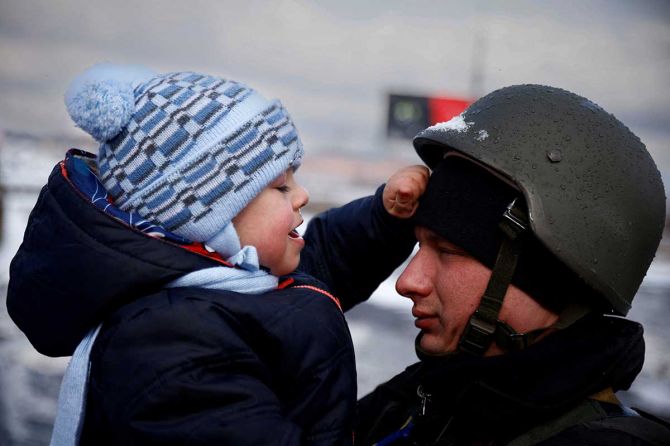
How long can the Sahay family continue to pluckily hunker down in their home? What if it becomes no longer safe to do so, because the shelling becomes too much or the heat goes.
Sahay says if the situation becomes too dangerous, they will try and use any sliver of chance to run for it and go west.
In the west too, if circumstances worsen, then at least some of them, may try to get out of the country.
"Toh mere khayal se mein London nikal jaunga (I will leave for London)." He has a friend there.
"Paach-10 din ke liye takleef nahin hai. Utna khane-peene ka samaan mere paas store kiya hua hai. Lekin agar lamba chala toh problem hoga (We won't face any difficulty in the next five to ten days. I have enough food stored. But if it goes on longer, it will be a problem)."

Sahay is not too sanguine about how Ukraine will be able to beat back the Russians. His verdict: "Bahut chance tough hai".
How he sees it: Ukraine needs weapons. The latest weapons are what Volodymyr Zelenskyy has asked for. If they have weapons, they have a fighting chance.
"Pura Europe darta hai Vladimir Putin se. Biden bhi darta hai (The whole of Europe fears Putin. Joe Biden does too)." That was evident from the refusal to institute a no-fly zone over Ukraine.
Inside Russia no one knows what Putin is up to. But there are soldier deaths, which will be hidden, the bodies may be burnt, suggests Sahay, but at some point "Iska parents toh poochenge bhai mera beta kahan hai? (At some point a soldier's parents will ask: 'Where is my son?')."
Sahay says Zelenskyy will try to drag the situation along as long as he can -- "war kheecha jayega" -- in the hope that there might be revolt and revolution in Russia.
"Situation bahut critical hai. Ninety-one per cent log president ko support kar rahein hai, pura country. Bahut bari baat hai (The situation is very critical. But Zelenskyy has 91 per cent support. That's huge)."
The reverential pride in Sahay's voice is unmistakable when he adds: "Jo bhi lad raha hai bahut himmat se lad raha hai. Jazba ke saath. Apna desh prem bahut zyada hai (Those who are fighting are fighting with great courage. And spirit. There is a lot of love for country -- their country Ukraine)."
*Name changed
Feature Presentation: Ashish Narsale/Rediff.com

